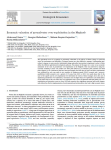Zaatra A., Kleftodimos G., Requier-Desjardins M., Belhouchette H. (2025). Economic valuation of groundwater over-exploitation in the Maghreb. Ecological Economics, 01/04/2025, vol. 230, p. 108499.
https://doi.org/10.1016/j.ecolecon.2024.108499
https://doi.org/10.1016/j.ecolecon.2024.108499
| Titre : | Economic valuation of groundwater over-exploitation in the Maghreb (2025) |
| Auteurs : | A. Zaatra ; G. Kleftodimos ; M. Requier-Desjardins ; H. Belhouchette |
| Type de document : | Article |
| Dans : | Ecological Economics (vol. 230, April 2025) |
| Article en page(s) : | p. 108499 |
| Langues : | Anglais |
| Langues du résumé : | Anglais |
| Catégories : |
Catégories principales 07 - ENVIRONNEMENT ; 7.3 - Eau. Gestion de l'EauThésaurus IAMM EVALUATION ECONOMIQUE ; ANALYSE DES COUTS ; EPUISEMENT DES RESSOURCES ; EAU SOUTERRAINE ; CULTURE IRRIGUEE ; MODELE BIOECONOMIQUE ; ZONE SEMI ARIDE ; ETUDE DE CAS ; MAROC ; TUNISIE ; ALGERIE ; REGION MEDITERRANEENNE |
| Résumé : | The agricultural sector is recognized as particularly vulnerable to the effects of climate change. In semi-arid areas, the performance and durability of irrigated systems are often difficult to manage. Understanding agriculture's response to water scarcity, institutional change and policy interventions is important in order to better define the different agricultural development pathways. The purpose of this paper is to carry out an economic assessment of the costs of groundwater over-exploitation in the Maghreb. This was achieved by using bio-economic modeling in three case studies: the Saïss plain (Morocco), El Haouaria plain (Tunisia) and Sétif plain (Algeria). A set of indicators (land use, farm gross margin, the dual value of water and labor requirements) was calculated for each case study in two scenarios (a business-as-usual (S_BAU) scenario and a return-to-equilibrium (S_RtE) scenario) over a period of 15 years, from 2021 to 2035. Our results show that (i) the state of the aquifer and its over-exploitation level determine the extent of future changes; (ii) in the case of significant groundwater over-exploitation, restoration costs are higher than over-exploitation costs (Saïss plain); on the other hand, in the case where the over-exploitation rate is lower (El Haouaria and Sétif plains), the over-exploitation and restoration costs are close; (iii) both scenarios show significant structural and social changes, and without the effective implementation of environmental and social policies, they lead to high economic losses. |
| Note de contenu : | This work was supported by the Deutsche Gesellschaft für Internationale Zusammenarbeit (GIZ) and the Sahara and Sahel Observatory (OSS) for an expertise carried out as part of the CREM (Regional Cooperation for a Sustainable Management of the Water Resources in the Maghreb) project. Project number: 18.2124.8-001.00. |
| Cote : | Online |
| URL / DOI : | https://doi.org/10.1016/j.ecolecon.2024.108499 |
Documents numériques (1)
PRO52453.pdf Adobe Acrobat PDF |







